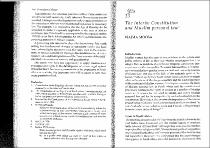| dc.contributor.author | Moosa, Najma | |
| dc.date.accessioned | 2022-09-23T10:05:49Z | |
| dc.date.available | 2022-09-23T10:05:49Z | |
| dc.date.issued | 1995 | |
| dc.identifier.citation | Moosa, N. (1995) “The interim Constitution and Muslim personal law” in Liebenberg, S (ed). The Constitution of South Africa from a Gender Perspective, Cape Town:Community Law Centre (UWC) in association with David Philip), 167-184 | en_US |
| dc.identifier.uri | 10.1093/lawfam/ebq012 | |
| dc.identifier.uri | http://hdl.handle.net/10566/7960 | |
| dc.description.abstract | Muslim women face the same status problems in the private and public spheres of life as their non-muslim counterparts but it is alleged that, as members of a particular religious community, they experience another inequality. To assess this assertion, it is necessary to consider how gender issues are dealt with not only in Islamic law, but also in the light of the authentic spirit of the Koran. With an eye to how South Africa's final constitution might address the status of Muslim personal law and the related question of the position of Muslim women, this chapter examines the issue of Muslim Personal Law in South Africa and the constitutional provisions relating to the rights of women in a number of Muslim countries. | en_US |
| dc.language.iso | en | en_US |
| dc.publisher | Cape Town Community Law Centre | en_US |
| dc.subject | Interim Constitution | en_US |
| dc.subject | Muslim Personal Law | en_US |
| dc.subject | Constitutional Law | en_US |
| dc.subject | Islamic Law | en_US |
| dc.subject | Islamic Law in South Africa | en_US |
| dc.title | The interim Constitution and Muslim personal law” | en_US |
| dc.type | Book chapter | en_US |

